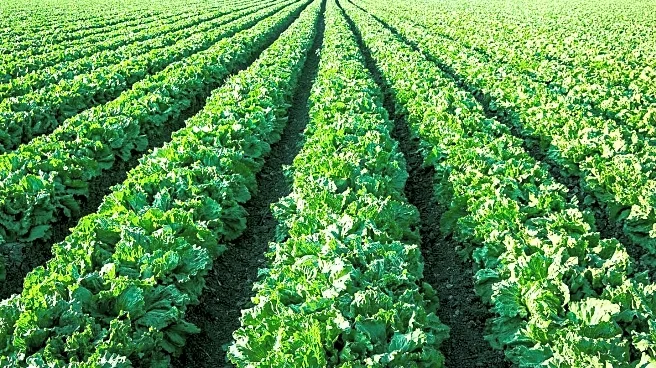What's Happening?
China's innovations in sustainable agriculture were highlighted at the United Nations Food and Agriculture Organization Global Exhibition in Rome. The event, themed 'From seeds to delicacies', showcased China's Geographical Indications Environment & Sustainability System, which integrates geospatial tracing, big data, Internet of Things, and artificial intelligence tools to protect ecological foundations of geographical indication products. The system supports 26 demonstration sites across China, promoting eco-friendly production and consumer trust in specialty agricultural products. Bhutan and Nepal have adopted the system to enhance their agricultural practices, benefiting farmers and the environment.
Why It's Important?
China's advancements in sustainable agriculture have significant implications for global food security and environmental protection. By integrating technology with ecological preservation, China is setting a precedent for sustainable agricultural practices that can be adopted worldwide. The system's application in Bhutan and Nepal demonstrates its potential to improve agricultural productivity and sustainability in diverse regions. As countries seek to balance agricultural development with environmental conservation, China's approach offers a model for achieving these goals, potentially influencing international agricultural policies and practices.
What's Next?
Countries like Indonesia are initiating the comprehensive application of China's Geographical Indications Environment & Sustainability System to drive agricultural modernization. This could lead to enhanced recognition, value, and marketability of special agricultural products, showcasing their unique regional characteristics. As more countries adopt these practices, there may be increased collaboration and technology transfer in the agricultural sector, fostering global partnerships for sustainable development.
Beyond the Headlines
China's commitment to science-driven sustainability in agriculture may influence global perceptions of its role in environmental conservation. The integration of advanced technologies in agriculture could lead to long-term shifts in how countries approach food production and ecological protection. Ethical considerations regarding technology transfer and capacity building in developing countries may also arise, highlighting the importance of equitable access to sustainable agricultural innovations.










